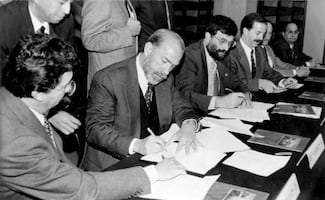Más Información

Morena en San Lázaro cierra filas con Claudia Sheinbaum por reforma electoral; Monreal reconoce que no hay acuerdo con aliados

Gurría Treviño, salario mensual equivalía al de dos presidentes de México; se jubiló a los 43 años con jugosa pensión

Familiares del matrimonio poblano asesinado exigen agotar todas las líneas de investigación; "no descansaremos hasta obtener verdad y justicia"

Cae jefe operativo del CJNG, junto a 13 presuntos secuestradores en Veracruz; liberan a una persona privada de su libertad

Investigan desaparición del hijo del exsenador Jorge Luis Preciado tras localizar su auto calcinado; revisan cámaras de la zona
Serious challenges still lie ahead for the United States-Mexico-Canada Agreement ( USMCA ) formally signed today in Buenos Aires by the three governments involved, including the new Democratic majority in the U.S. House of Representatives , as well as the unresolved trade issues between Ottawa and Washington .
Hastily announced on September 30 after more than a year of negotiations to “ modernize ” the North American Free Trade Agreement ( NAFTA ), the new commercial pact was until this week a source of dispute, due to a “ legal scrub ” of the text posted online by the U.S. Trade Representative’s Office on October 1 , showing language Canadian negotiators apparently never approved.
Canada
, reported CBC News on Wednesday, has not posted its official version of the agreement in English nor French, “leaving it unclear whether the USTR’s version will be the one the three countries actually signed in two days.”
Hours before boarding a flight to Argentina for a meeting of the G20 leaders—and the framework of the USMCA signing ceremony— Canadian Prime Minister Justin Trudeau said his country was “still in discussions,” alluding to the Annex 3-B ( agricultural trade between Canada and the U.S. ) which set out notifications requirements for Canada should it want to change tariffs for its supply-managed dairy , poultry or egg industries .
According to the U.S. version, Canada would need to notify its southern neighbor whenever it makes any changes to customs duties on these products before these changes are finalized, allowing U.S. officials to review the decision and request more information.
While there have always been ways for the U.S. to respond to Canadian duties it finds unjust (by launching arbitration cases before the World Trade Organization , for instance), the U.S. text “raises a sovereignty concern. It appears to interfere with Canada’s ability to make its own tariff decision and administer its system as it sees fit,” underscored CBC News .
Even in the name of the agreement, there are discrepancies: Last week, Canadian Global Affairs minister Chrystia Freeland said that in her country documents its called “ CUSMA ,” putting Canada first , so she prefers to call it “ the new NAFTA .”
In Mexico , the outgoing President Enrique Peña Nieto may have got his wish of signing the pact during his last official trip, yet it is not clear whether its congressional ratification is a priority for the President-elect Andrés Manuel López Obrador , who supported the final negotiations.
Legislative majority
Enjoying a large majority in both chambers of Congress, López Obrador should face no problem to ratify what in Mexico is called T-MEC or TEMEC ( Tratado México-Estados Unidos-Canadá .)
For his part, outgoing Economy Minister Ildefonso Guajardo asked the Senate to approve the deal without changes, warning that there will be “pressures” to modify it.
“There will be many pressures seeking that you try to modify the agreement, using as pretext the votes needed to approve it. My advice is to maintain the line over what has been agreed. The deal is good enough for those who are going to take decisions in Canada as well as in the United States , and Mexico ,” he said in reference to the new Democratic majority in the U.S. lower chamber .
In Capitol Hill , pundits anticipate a series of Democratic proposals on environment protection and labor rules that would delay the ratification process .
The USMCA deal would be effective on 2020 , the U.S. presidential election year that could turn the Democrat lawmakers into the “party of no,” as former President Barack Obama used to call the Republican Congress which blocked his major initiatives on migration and foreign relations for political reasons during his second administration.
Representative Nancy Pelosi
, current House minority leader —she won the Democratic nomination on Wednesday as the next House speaker in the 115th Congress , which will be sworn in on January 3, 2019 —said that her caucus will not advance on the ratification process until the Mexican Congress approves the labor clauses.
The White House needs 218 votes —the Democrats will have 235 of the 245 seats—for the agreement to pass in the House. If ratified, USMCA holds for 16 years and is subject to a review every six years.
The opposition to the deal, nevertheless, is also coming from the Republican side. This month, 46 conservative House Republicans sent a letter to President Donald Trump asking him to remove language from the agreement that included sexual orientation and gender identity ( SOGI ) as protected classes.
Chapter 23
of USMCA has two SOGI references in clauses establishing nondiscrimination standards for workplaces.
The conservative lawmakers said SOGI language has never been included in a trade deal and doing so circumvented the ability of the U.S. to set its own policies regarding discrimination.
Until the USMCA deal is passed by the three partners’ legislative branches, NAFTA will still be in effect.
The new agreement is different from NAFTA regarding trade of goods
, most notably the U.S. dairy industry being allowed to tap into the Canadian dairy market, yet still remains relatively the same regarding the trade of services.
However, the new Section 32 restricts Mexico , Canada , and the U.S. from negotiating trade deals with “non market countries” such as China, immersed in a trade war with the U.S. This means that consumers and business which have benefited from low-cost China finished goods are the losers of the USMCA .
Editing by Sofía Danis
More by Gabriel Moyssen
Noticias según tus intereses
[Publicidad]
[Publicidad]










